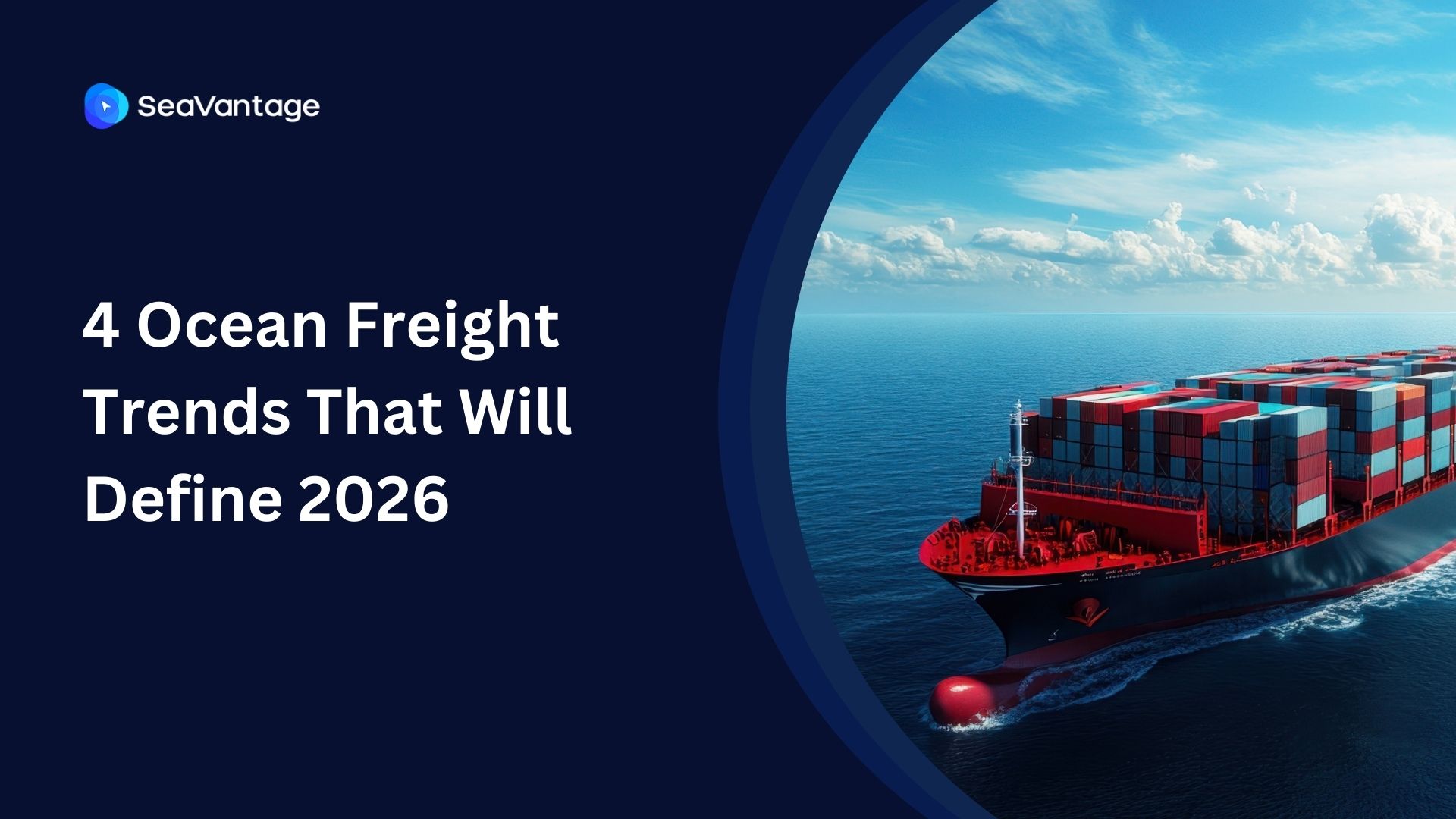The Top 10 Container Terminal Operators in International Trade - 2024
Introduction
The global container shipping industry is a cornerstone of international trade, enabling the efficient movement of goods across continents. Container terminal operators play a crucial role in this industry, providing the infrastructure and services needed to handle the vast volumes of cargo that traverse the world's oceans. These operators manage the ports where containers are loaded and unloaded, ensuring the smooth flow of trade and logistics. This article aims to highlight the top 10 container terminal operators worldwide, showcasing their significance in the global supply chain.
Methodology
To rank the largest container terminal operators, we considered several key criteria:
1. Annual Container Throughput: The volume of containers handled annually, measured in Twenty-foot Equivalent Units (TEUs), serves as a primary indicator of an operator's capacity and scale.
2. Global Reach: The geographical spread of an operator's terminals indicates its influence and connectivity in global trade routes.
3. Number of Terminals: The total number of terminals managed by an operator reflects its operational scope and ability to serve multiple markets.
Data for this ranking were sourced from industry reports, financial disclosures, and direct company information.
1. PSA International
Overview and History: PSA International, formerly the Port of Singapore Authority, transitioned in 1996 to focus solely on managing and commercially operating container terminals after its regulatory functions were transferred to the Maritime and Port Authority of Singapore. Now a global leader in the ports and terminals industry, PSA operates across five key regions: Southeast Asia, Middle East South Asia, Northeast Asia, Europe and Mediterranean, and the Americas. PSA is renowned for its efficiency, speed, and reliability, boasting a rich history of innovation in container handling technology and customer service. Starting as a pioneering container port in the 1970s, PSA has grown into a world-class operator, handling about one-fifth of the world’s transhipped containers, with a robust financial profile and a strong emphasis on global partnerships and customer satisfaction.
Annual Container Throughput and Global Reach: In 2023, PSA handled 94.8 million TEUs across its port terminals around the world for the year ended 31 December 2023.
Key Terminals and Locations: Notable terminals include PSA Singapore Terminals, PSA Antwerp, and PSA Panama International Terminal.
2. Hutchison Ports
Overview and History: Hutchison Ports is a private holding company incorporated in the British Virgin Islands and a subsidiary of CK Hutchison Holdings. By 2016, Hutchison Ports operated 48 port facilities across Asia, the Middle East, Africa, Europe, the Americas, and Australasia. In 2005, it was the largest port operator globally, handling 33.2 million TEUs and holding an 8.3% market share. In 2006, Hutchison Whampoa sold a 20% stake in HPH to PSA International. In 2011, some assets were spun off into Hutchison Port Holdings Trust, a listed business trust in Singapore, where Hutchison Whampoa retained significant influence. The company rebranded as Hutchison Ports in 2016, expanding its network to include operations in Ukraine and additional investments in Shenzhen.
Annual Container Throughput and Global Reach: In 2023, Hutchison Ports handled a total of 82.1 million TEU (twenty-foot equivalent units) across its network of 53 ports in 24 countries.
Key Terminals and Locations: Key terminals include Hong Kong International Terminals (HIT), Yantian International Container Terminals (YICT), and Port of Felixstowe.
3. APM Terminals
Overview and History: APM Terminals, a unit of Maersk's Transport and Logistics division, is headquartered in The Hague, Netherlands, and operates 74 port and terminal facilities in 38 countries, along with over 100 inland services operations. The company, founded in 2001 as part of the A.P. Moller - Maersk Group, has a global presence in 58 countries and provides services to over 60 shipping lines. In 2018, APM Terminals was ranked as the world's fifth-largest container terminal operator. The company has been expanding its capacity with ongoing projects in Mexico, Morocco, Oman, the Netherlands, and Georgia. APM Terminals has also committed to achieving net-zero emissions by 2040, with significant progress made in reducing emissions and increasing the use of renewable energy. Additionally, APM Terminals launched a $60 million electrification pilot program and established the Zero Emission Port Alliance to accelerate the decarbonization of the industry.
Key Terminals and Locations: APM Terminals has many key terminals around the world, including terminals in the Americas, Asia, and Europe. APM Terminals Pier 400 Los Angeles, APM Terminals Port Elizabeth, APM Terminals Mumbai.
4. DP World
Overview and History: DP World, an Emirati multinational logistics company based in Dubai, specializes in cargo logistics, port terminal operations, maritime services, and free trade zones. Formed in 2005 from the merger of Dubai Ports Authority and Dubai Ports International, DP World manages 82 marine and inland terminals across over 40 countries, handling around 10% of global container traffic. The company's history includes significant acquisitions, such as the purchase of P&O in 2006, making it one of the largest port operators worldwide. DP World faced controversy in 2006 over its management of U.S. ports and later listed on the NASDAQ Dubai stock exchange in 2007. The company has continued to expand, including repurchasing P&O Ferries in 2019 and engaging in various international projects. In recent years, DP World has undergone corporate restructuring, faced challenges such as the COVID-19 pandemic, and dealt with controversies like the mass redundancy of P&O Ferries staff in 2022. In 2023, a cyberattack disrupted its operations in Australia, highlighting the company's significant role in global logistics.
Annual Container Throughput and Global Reach: The company handled approximately 81.5 million TEUs in 2023, operating 78 terminals in 40 countries.
Key Terminals and Locations: Key facilities include Jebel Ali Port, London Gateway, and DP World Antwerp Gateway.
5. China COSCO Shipping Corporation
Overview and History: China COSCO Shipping Corporation Limited (COSCO Shipping) is a state-owned multinational conglomerate based in Shanghai, specializing in marine transportation services. Formed in January 2016 through the merger of COSCO Group and China Shipping Group, COSCO Shipping operates one of the world's largest fleets, with 1,310 vessels and a capacity of 105.92 million DWT as of March 2020. Its predecessors, COSCO and China Shipping, were major players in dry bulk and container shipping. The merger aimed to achieve economies of scale amid a downturn in the industry and align with China's strategy to restructure its state-owned enterprises. COSCO Shipping has since expanded through strategic acquisitions, including a majority stake in Orient Overseas International Limited, the operator of OOCL. The company has also invested in global port operations, such as acquiring a stake in the Piraeus Port Authority and developing infrastructure under the Belt and Road Initiative. In recent years, COSCO Shipping has been involved in integrating 5G technology into port operations and exploring blockchain applications in partnership with Alibaba. The company faced sanctions from the U.S. in 2019 due to its tanker subsidiary's dealings with Iran, which were lifted in early 2020.
Annual Container Throughput and Global Reach: The company handled around 135 million TEUs in 2023, with operations in around 37 terminals worldwide.
Key Terminals and Locations: Notable terminals include Piraeus Container Terminal, COSCO-PSA Terminal in Singapore, and Xiamen Ocean Gate Container Terminal.
6. Shanghai International Port Group (SIPG)
Overview and History: Shanghai International Port (Group) Co., Ltd. (SIPG) is a public terminal operator for the Port of Shanghai, listed on the Shanghai Stock Exchange since October 26, 2006, becoming China's first fully listed port joint-stock company. Situated at a strategic intersection of China's eastern coastline, the Port of Shanghai benefits from extensive waterway connections including the Yangtze River, facilitating access to both domestic and international markets. SIPG was established in January 2003 from the restructuring of the Shanghai Port Authority and became a shareholding company in June 2005. It is the largest listed port operation company in mainland China and among the largest globally. SIPG's operations span port handling, integrated logistics, port-related services, and port investment, supported by a comprehensive port logistics chain.
Annual Container Throughput and Global Reach: SIPG managed over 49 million TEUs in 2023, primarily operating in China but with growing international ambitions.
Key Terminals and Locations: Key facilities include the Port of Shanghai, the busiest container port globally, and Yangshan Deep Water Port.
7. Terminal Investment Limited (TIL)
Overview and History: Terminal Investment Limited (TiL), established in 2000 by the Aponte Family, aims to secure container terminal capacity for MSC Mediterranean Shipping Company, the world's largest shipping line and TiL's majority owner and primary client. TiL's business model and strategy are deeply aligned with MSC, leveraging this relationship to achieve rapid growth, stable throughput volumes, long-term contracts, and strategic investments. TiL's portfolio includes container terminals in key global ports like Singapore, Ningbo, Busan, Los Angeles, Long Beach, Rotterdam, Antwerp, New York/New Jersey, and Valencia, enabling access to major shipping routes and markets.
Key Terminals and Locations: Major terminals include MSC Terminal Valencia, Terminal de Contenedores de Moín (TCM) in Costa Rica, and Gioia Tauro Port.
8. Ports America
Overview and History: Ports America, the leading American marine terminal operator and stevedore, boasts a rich history that spans over a century, shaped by a lineage of legacy companies that have significantly influenced the maritime industry. Founded in 1922 with the establishment of the International Terminal Operating Company and P&O Ports North America, and later joined by Marine Terminals Corporation in 1931, the company has withstood historical challenges such as the Great Depression, major wars, political upheaval, and a global pandemic. In 2007, these entities merged to form the unified Ports America brand. Through public-private partnerships, Ports America has played a pivotal role in major infrastructure initiatives at both local and national levels. Beyond traditional stevedoring and marine terminal operations, Ports America has expanded into a comprehensive supply chain logistics provider, leveraging its vast network to offer diverse transportation solutions. As the leading container terminal operator in the U.S., handling approximately 19.2 million TEU annually, Ports America remains committed to innovation and technology, ensuring maximum value and service for its customers.
Annual Container Throughput and Global Reach: The company handles approximately 19.2 million TEUs annually, with operations at 33 ports.
Key Terminals and Locations: Key terminals include the Port of Los Angeles, Port Newark Container Terminal, and Port of Baltimore.
9. Eurogate
Overview and History: Eurogate is a leading independent container terminal operator in Europe, renowned for its reliable and professional container handling services. Headquartered in the Hanseatic City of Bremen, Eurogate serves as a vital hub for global trade, operating several sea terminals on the North Sea, the Mediterranean, and the Atlantic in partnership with its sister company, Contship Italia. As a gateway for European goods traffic, EUROGATE not only excels in container handling but also offers comprehensive solutions to streamline port processes and expedite global transportation. These include container storage, maintenance, repairs, and the development of customized packaging concepts, as well as support for planning and implementing intermodal transport routes. The company's strengths lie in its high productivity rates, well-coordinated work processes, and a dedicated team passionate about the port industry. Committed to continuous improvement, Eurogate invests in technological advancements at its various locations, aiming not just to meet but to exceed expectations. This dedication extends to shaping a sustainable future with a port infrastructure that adapts to dynamic demands while minimizing environmental impact, embodying their commitment to maximum efficiency, minimal emissions, and maximum safety.
Annual Container Throughput and Global Reach: Eurogate handles around 13 million TEUs annually, with operations in 8 terminals across Europe.
Key Terminals and Locations: Key facilities include the Container Terminal Bremerhaven, Hamburg's Eurogate Container Terminal, and the Terminal La Spezia in Italy.
10. Evergreen Marine Corp.
Overview and History: Founded on September 1, 1968, by Dr. Yung-Fa Chang, Evergreen Marine has grown from a modest general cargo ship operator into a major global shipping company with a fleet of over 200 full-container vessels. The company emphasizes profitability, employee welfare, and societal contributions, and is known for its commitment to environmental sustainability, developing eco-friendly ships and reducing greenhouse gas emissions. Evergreen Marine also values transparency and ethical practices, adhering to global regulations. Through strategic alliances and digital platforms, the company enhances its operational competitiveness and supports global trade, all while upholding strong ESG principles.
Annual Container Throughput and Global Reach: The company managed around 28 million TEUs in 2023, with a presence in key strategic locations globally.
Key Terminals and Locations: Key terminals include the Evergreen Kaohsiung Container Terminal, Colon Container Terminal in Panama, and the Taipei Port.
Trends and Future Outlook
The container terminal industry is evolving with several key trends shaping its future:
1. Automation: Increasing adoption of automated systems and technologies to improve efficiency and reduce labor costs.
2. Sustainability: A growing focus on green initiatives and sustainable practices, including the use of renewable energy and reducing carbon emissions.
3. Digitalization: Enhanced data analytics and digital solutions to streamline operations and improve transparency.
The largest container terminal operators face challenges such as geopolitical uncertainties, fluctuating trade volumes, and the need for continuous investment in infrastructure. However, these challenges also present opportunities for growth and innovation, potentially reshaping the rankings in the coming years.
Conclusion
The top 10 container terminal operators are critical players in the global logistics network, handling a substantial portion of the world's cargo. Their operations are pivotal in ensuring the smooth flow of goods across continents, impacting global trade and economies. As the industry continues to evolve, these operators must adapt to emerging trends and challenges, shaping the future of the container terminal landscape.
2025년 9월, 주요 글로벌 항만에서 어떤 운송사가 가장 긴 선박 체류 시간을 기록했는지 확인해보세요. 트렌드를 비교하고, 지연을 파악하며, 전체 항만 데이터를 통해 운송 전략을 최적화할 수 있습니다.
2025년 8월, 주요 글로벌 항만에서 어떤 운송사가 가장 긴 선박 체류 시간을 기록했는지 확인해보세요. 트렌드를 비교하고, 지연을 파악하며, 전체 항만 데이터를 통해 운송 전략을 최적화할 수 있습니다.
2025년 7월, 주요 글로벌 항만에서 어떤 운송사가 가장 긴 선박 체류 시간을 기록했는지 확인해보세요. 트렌드를 비교하고, 지연을 파악하며, 전체 항만 데이터를 통해 운송 전략을 최적화할 수 있습니다.
Explore how tariffs, blank sailings, port congestion, and canal disruptions reshaped global ocean shipping in 2025 — and what supply chain leaders must do next.
Is your ocean supply chain ready for 2026? Discover 4 critical trends, from weather disruptions to strategic booking, and how to adapt.
iscover the 4 critical ocean freight trends for 2026, from the Red Sea reopening and fleet overcapacity to shifting global trade maps. Prepare your supply chain now.



.svg)







.png)